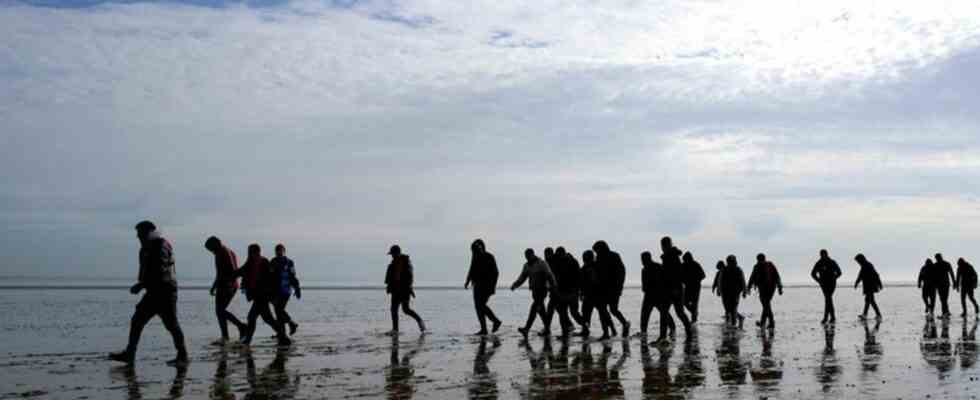Great Britain
Why so many Albanians come across the English Channel
Suspected migrants at Dungeness after being brought ashore by a Royal National Lifeboat Institution (RNLI) lifeboat following an incident involving a small boat in the English Channel. photo
© Gareth Fuller/PA Wire/dpa
From Albania alone, more than 12,000 people are said to have entered the UK illegally via the English Channel this year. In 2021 there were a total of 50. Where does the sudden jump come from?
When British Home Secretary Suella Braverman refers to tens of thousands of migrants as an “invasion,” she also means people like Iva and Denis. The 31-year-old and the 26-year-old from Albania came across the English Channel to look for work – but illegally, as they tell Sky News. Like her, many people dare the dangerous crossing. This Wednesday (November 24) marks a year since a boat carrying migrants capsized in the straits between France and Great Britain. 27 people drowned. Since then, the number of people taking the risk has only increased.
In focus: impoverished Albania. According to estimates, more than 12,000 people from the Balkan state have reached the United Kingdom illegally this year. That is almost a third of the total number of more than 40,000 migrants. In the summer, Albanians are said to have made up around 60 percent of the arrivals on some days. Most are men – up to 2 percent of the total adult male population, according to London data. The increase is exponential, a senior Home Office official said. A total of 50 Albanians arrived in 2021 as a whole.
Advertising clips in online media entice people to make the crossing
A catalyst is advertising for the crossing on social media like Tiktok, which is aimed at people from the country, reported the investigative news portal Mediapart in France. Video clips show people laughing in boats with plenty of space during the crossing, the sea is calm and cheerful music is playing. “There are crossings every day,” says one of the videos in Albanian. “The passage is done in one day. Hurry, at the best price. A sacrifice for a better life.”
The reason for many: economic hardship in the country with around 2.8 million inhabitants. Young people like Iva and Denis, who had a job – she as a stockbroker, he in a private clinic – see no prospects for themselves.
Albania is a classic emigration country. About 42,000 citizens per year have turned their backs on their homeland in the past ten years, according to the Albanian statistical office. Bitter poverty with average salaries of 400 to 500 euros a month, inadequate infrastructure and the lack of prospects of being able to lead a dignified life with honest work have prompted younger people in particular to seek their fortune abroad for decades. After the end of communism in 1991, they mainly headed for neighboring Greece. The images of the chaotic flight of tens of thousands on overcrowded ships across the Straits of Otranto to Italy also remain in the memory.
Many try their luck illegally
Now Great Britain is one of the most important destination countries. Thousands of Albanians already live here legally. An 18-year-old who was unable to obtain German residence permits wants to visit distant relatives in England. “I don’t go there on the spur of the moment,” he told the French newspaper Le Monde. “I already have an apartment and a job as a tiler waiting for me.” Another refers to the earning potential: a maximum of 300 euros in Albania, more than 2000 euros in Great Britain. But visas are expensive, time-consuming and difficult to obtain. Many try their luck illegally.
The Albanian media suspect criminal networks that organize the often dangerous transport across the English Channel – and are paying dearly for it – to be behind the increase. Something similar can be heard in London: Albanian criminal gangs have gained a foothold in northern France and have begun to smuggle mainly Albanians.
“In addition to the economic motives, it is also about the quality of government and future prospects,” said Alfred Rakipi, head of the Albanian Institute for Public Relations, to the “euractiv” portal. “People don’t trust (in politics), they don’t see any light at the end of the tunnel and they don’t think they have a future here.”
An agreement with Paris should remedy the situation
In order to reduce the number of illegal crossings, London recently concluded an agreement with Paris. In addition, Great Britain now wants to support infrastructure projects in Albania with several million pounds, in order to offer younger people in particular a perspective at home, as the newspaper “Telegraph” reported. State Secretary Robert Jenrick, responsible for migration, told BBC Radio 4 that there was still no agreement with Tirana.
The dispute over the harsh rhetoric of the conservative hardliner Braverman may have to be clarified first. Albania’s Prime Minister Edi Rama had sharply criticized the stigmatization of Albanian immigrants in London as “criminals” and “social parasites”: “Britain should fight criminal gangs of all nationalities and stop discriminating against Albanians in order to distract attention from (its own) political failures.” Thousands of Albanians took to the streets in London. Stock trader Iva also rejects prejudices. “I’m a decent person. I can integrate into society,” she told Sky News.

